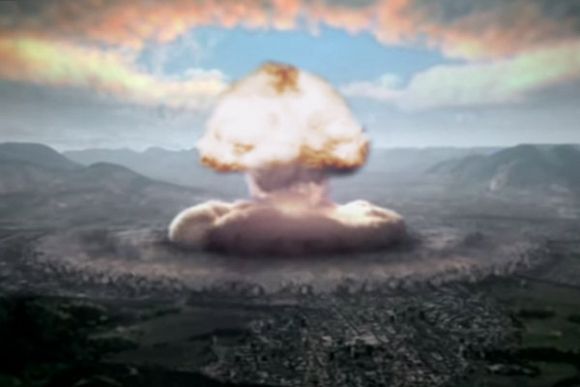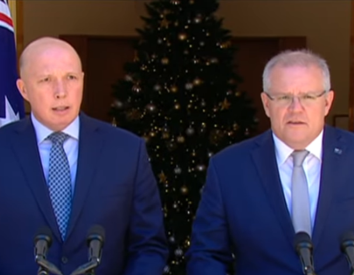Australians need to be realistic when it comes to China, write Dr Dean Aszkielowicz and Paul Taucher.
THE LAST MAJOR CONFLICT in the Pacific ended over 75 years ago. Japan, the United States, China and the European colonial powers fought a war that cost millions of lives. It contributed to the downfall of several empires and overturned the regional political order.
Further, the American use of atomic bombs against Japan led to subsequent generations living with the fear of nuclear war.
Public figures in Australia who are now loudly predicting that a war with China is looming, ought to think carefully about something like this scenario playing out again. No matter what the behaviour of the Chinese regime is, or what the status of bilateral relations are, war is not an option.
Australia’s message must be peace. At the end of both World War I and World War II, and again in the wake of the Cold War, political leaders and diplomats insisted that dialogue and international institutions are the key to a peaceful world. This view has persisted and the hope is that cooperation in politics, economics and security will protect sovereignty, increase prosperity, and allow smaller countries to determine their own path in world affairs.
This framework is known as a rules-based order and for much of the post-war era, many countries – including Australia – invested heavily in it. Indeed, much of the recent Australian angst over China stems from a belief that the regime is acting in a way that does not meet these international expectations.
Lately, however, the talk of war in Australia reflects its own emerging lack of faith in the rules-based order and a belief that ultimately the region will collapse into war. This belief downplays Australia’s ability to achieve its goals through diplomacy in the international arena.
Australians who entertain the thought of war also dramatically overstate the ability of the military in the face of an opponent like China. The Australian Defence Force (ADF) is effective, technically advanced and has a proud history. It has made major contributions to peacekeeping operations and supported the U.S. military.
The ADF has been most effective is as a diplomatic tool, by responding to disasters across the globe and through peacekeeping. In these kinds of deployments, the ADF makes an important contribution to supporting a rules-based order.
Much of Australia’s international reputation is built on these operations, and this work is indispensable in building and maintaining partnerships. The most challenging deployments, on the other hand, have been when the ADF has paid the price on behalf of the government for political crusades into practically unwinnable wars.
Australia does not have the capacity to fight a major war with China and deliver results that the Australian people would find acceptable in the aftermath of it. China is a major military and industrial power, whereas Australia is not.
When people predict a war is coming, they are predicting the deaths of thousands of Australians, the destruction of millions of dollars of ADF equipment and the collapse of a key Australian trade relationship.
This needs to be discussed much more openly if people are talking about war.
Even a limited war with China would deliver these outcomes. There are no guarantees, however, that a war would be contained at all, in which case the consequences for Australia would be an order of magnitude larger.
CNN made its thoughts clear when it called the notion of Australia fighting a war with China “ridiculous”.
Of course, those who insist that war with China is looming assume that Australia would not be on its own and would take part in the conflict in support of the U.S. They probably see war talk, in this context, as supporting the American agenda for the region. When the positions of Australia’s partners are considered, however, the recent war talk seems much more like Australia further escalating a situation that others would pay the highest price for.
Opinions in the U.S. are divided over how close war with China really is and over whether America is likely to win a war in the South China Sea. Some projections are very bleak.
Tellingly, Australia finds itself largely on its own in escalating war talk with China. Neither the U.S. nor China seem to want to go to war at the moment.
Nor do Australia’s democratic partners in Asia, most notably Japan. Its own relations with China are often tense and the Japanese public tends to hold a dim view of the Chinese regime. Japan faces a similar situation to Australia, where it has to balance relations with China and relations with America.
It is challenging, but achievable if peace is the priority.
The hawkish tone of recent comments in Australia are currently out of step with the other major players. They convey an inflated sense of the country’s readiness for such a war and represent a loss of faith in a regional order that Australians spent decades helping to build.
If people in government or the military feel war with China is likely, then they must do everything they can to cool tensions, which is something diplomatic institutions are well equipped for. Issues with China over territory, human rights, or trade, need to be addressed through a renewed commitment by Australia to international institutions and international conventions.
The military has a key role to play here, too, through its continued engagement and relationship building with other forces in the region, who remain committed to a peaceful future in the Pacific.
Progress would be incremental: it would not make for sensational speeches or copy, but this is a realistic reflection of how Australia’s government and military could make a positive contribution to the region and best protect country’s interests.
There are no other options for a power of Australia’s size: the path to war is a path to failure.
Dr Dean Aszkielowicz is a lecturer at Murdoch University.
Paul Taucher is a PhD candidate and casual tutor at Murdoch University with undergraduate degrees in Law and History.
Related Articles
- Morrison exploits the issue of China for domestic political gain
- Australians do not benefit from a war with China
- There is an alternative to war in the South China Sea
- Not sleepwalking but marching with eyes wide open to war
- Biden, alongside Morrison, Modi and Suga, continues conflict with China
 This work is licensed under a Creative Commons Attribution-NonCommercial-NoDerivs 3.0 Australia License
This work is licensed under a Creative Commons Attribution-NonCommercial-NoDerivs 3.0 Australia License
Support independent journalism Subscribe to IA.














